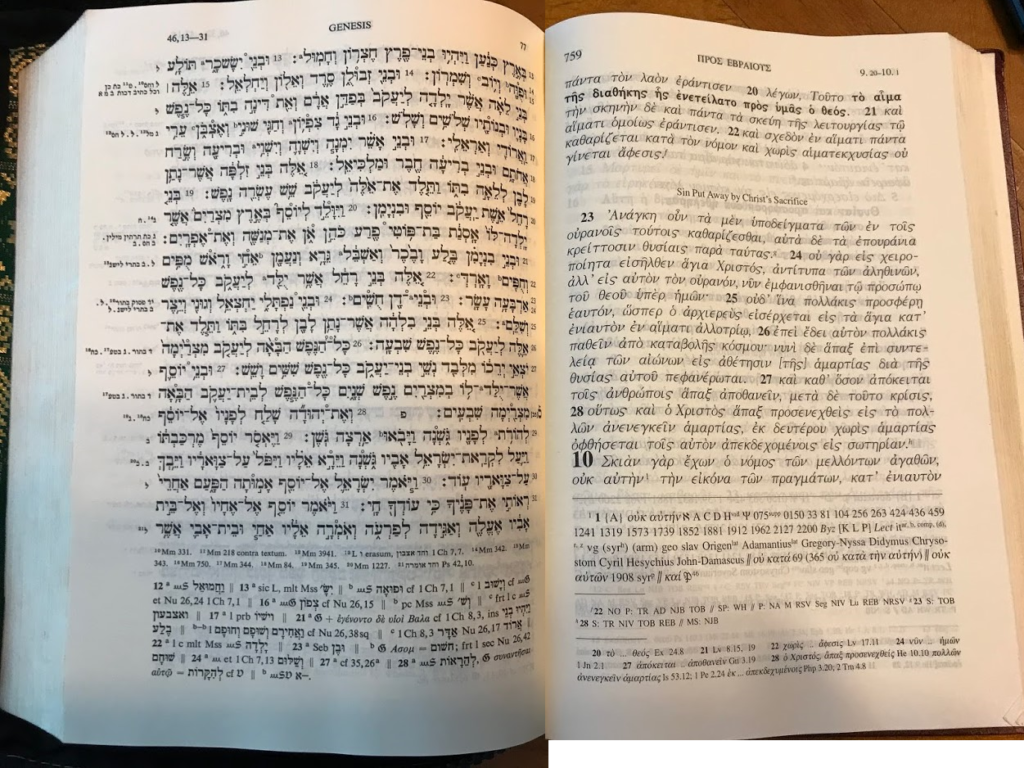
Someone asked what I thought of the NET Bible (https://netbible.org) and, rather than giving a simple thumbs up or thumbs down, I decided to go through the steps I took to make my evaluation, in case anyone wants to use them to evaluate other translations. Jump to the bottom if you just want my conclusions. (Note that almost all of my links are to Marg Mowczko’s blog. That’s because she does a great job of explaining the issues for non-scholars, and she has lots of footnotes for anyone who wants to dig deeper. Also, I don’t need to repeat what others have said at least as well as I could!)
The first thing to look at is the list of translators. I found it here, at the very end: https://bible.org/netbible/index.htm?pre.htm Note that these are exclusively men, and that Dallas Theological Seminary is heavily represented. Dallas is a complementarian school (http://www.womenandchurch.com/standings). So, this is not a good start for an egalitarian like me!
While we are here, we can also look at endorsements: https://netbible.com/endorsements/ They are all male except for Beth Moore and one seminary student. They are also mostly complementarian, from what I can see. And Beth Moore’s comment specifically references the notes, which I will come back to.
Next, I want to look at a series of verses that are helpful to get a sense of the translators’ gender biases. There are many options, but these are mine:
Gen 3:16: There are two issues here. The beginning of the verse says, in Hebrew, “I will greatly increase your pain and your conception/pregnancy.” Most translators combine this idea with the next line and assume that the pain referred to is specifically pain in childbirth. That is quite possible, and a hendiadys is something that Hebrew does do quite often. However, in the footnote, the translators justify their choice by saying “there is no pain in conception.” That comment could only come from an exclusively male perspective. The fact that they did not seriously consider the pain many women experience during conception and also during the whole of pregnancy reveals a bias that is confirmed by the translation of the second half of the verse. There, the NET says, “You will want to control your husband, but he will dominate you.” All translation is, of course, interpretation, but this goes beyond what I would consider to be allowable. You can read more about the issues here: https://margmowczko.com/translation-genesis-316/ The NET translators justify their choice by importing the idea of domination from Gen 4:7 into not only Gen 3:16 but also (based on the footnote for 3:16) into sexual desire as well. This turns natural sexual desire into rape, which is sin. I can only say I am horrified. 0/2
Ruth 3:11; Prov 12:4; 31:10, 29: The Hebrew word חַ֫יִל (chayil) is carries the idea of “strength” and so is usually translated “army” or “wealth” or “warrior.” Some translations, however, switch to words that they find more suitable for women in these verses in Proverbs, such as the NET does with “noble” or “worthy.” Prov 31:29 is an exception where the word is “valiently.” The footnotes do explain that these are all the same word. 1/4
Malachi 2:16: My Hebrew prof, who was, incidentally, complementarian, said that this is the most difficult verse to translate in the whole Old Testament. That is because the text in Hebrew, as we have it, simply does not make sense. The translators have chosen one option. The NIV (2011) chooses the other: “‘The man who hates and divorces his wife,’ says the Lord, the God of Israel, ‘does violence to the one he should protect,’ says the Lord Almighty.” What I object to the most here is the footnote which says “Though the statement ‘I hate divorce’ may (and should) be understood as a comprehensive biblical principle, the immediate context suggests that the divorce in view is that of one Jewish person by another in order to undertake subsequent marriages.” First, on what basis should this be taken as a comprehensive biblical principle? That goes against the often-stated rule that a Bible verse without a context is just a pretext for a prooftext. Bible verses must be taken in context. And then, this footnote suddenly becomes gender neutral when what is going on in the context is that priests are divorcing the mothers of their children in order to marry young foreign women (see Mal 2:11–15, as well as the whole book). 0.5/1
Rom 16:1, 7: There are several issues here. In verse 1, diakonos is translated “servant.” That is a possible translation, but the note is a bit disingenuous. On the basis that neither Epaphras nor Timothy are deacons, it is supposed that Phoebe cannot be. Yet the possibility of her being a minister is not considered. Especially given the support that Paul is requesting for her (v. 2), it seems likely that she is some sort of leader. (See https://margmowczko.com/phoebe-a-deacon-of-the-church-in-cenchrea-part-7/) 0/1
In verse 7, Junia is correctly identified as a woman, although do I read reluctance in the tone of the note? I am a bit confused by the reference to the TLG. The TLG is “a digital library of Greek literature.” It is possible that it has been updated since Moo did his search. But when I looked, I found 23 entries for Junia, and only one that is early (Plutarch, Brutus 7.1.4), from the 1–2nd century CE, where it’s a woman’s name. So I am not sure what the three are that Moo is referring to. In fact, however, the TLG does not differentiate between Junia (f.) and Junias (m.), and the same 23 instances come up when references to Junius (which Rom 16:7 cannot mean) are removed. Additionally, the Epiphanius reference that is mentioned in footnote 6 is from the 4th century CE, and therefore not particularly relevant. Junia, as footnote 6 mentions, is quite common in Latin, and apparently in Greek inscriptions, although I have not been able to verify that (see the footnotes here: https://margmowczko.com/junia-and-the-esv/). Finally, the end of footnote 6 and the entirety of 8 seek to support the NET’s chosen translation, “well known to the apostles.” Here is the argument against that translation: https://margmowczko.com/is-junia-well-known-to-the-apostles/ Additionally, I have looked for instances of episemoi en which is the phrase under debate, and I found two examples. One states that Aristophanes, as compared to the other authors, “shone forth among them all,” and the other, Lucian, in the 2nd century CE suggests that if there are rumors that you did not praise your boss/owner enough, you must be sure to raise your voice next time so that you stand out among her admirers. In both cases, the one being described is clearly part of the larger group to which he is being compared. I found no examples of the phrase being used the way the NET Bible translates it. Thus, it seems much more likely that Phoebe is a leader of the church at Cenchreae, and that Junia and Andronicus are outstanding among the apostles. 1/2
Eph 5:21–22: It’s always interesting to see where various translations divide the text. Manuscripts differ, but Paul’s sentence in Greek actually starts either at verse 18 or at verse 21. Furthermore, the verb “submit” was likely not repeated in verse 22, so starting the paragraph farther up (CEB chooses 15, NIV & NRSV 21) seems to make more sense. 0/1
1 Tim 2:12–15: Footnote 19 here is helpful in that it reminds readers that saying that women should learn was likely revolutionary. However, footnote 20 ignores the pages of writing and gallons of ink spilled over the meaning of the Greek verb translated here “exercise authority.” Here’s a summary of the issues: https://margmowczko.com/authentein-authenteo-1-timothy-2/ Footnote 24 goes a long way to come to an explicitly complementarian conclusion. It does do a good job of mentioning some of the various solutions to the verse along the way. And footnote 25 unaccountably dismisses the problems that the shift to the plural raises. Not sure how to grade this, but I will suggest a 1/3.
1 Tim 2:9; 3:2: The word κόσμιος (kosmios) is translated similarly for both women and men (“suitable” and “respectable”). 1/1
1 Tim 2:9, 15; 3:2; 2 Tim 1:7; Titus 1:8; 2:2, 5; Acts 26:25: The word σωφροσύνη (sōphrosunē) and cognates is sometimes translated differently for men and women. In the NET we find: “self-control” (6x for both men and women), “sensible” (men), “rational” (Paul). 3/3
1 Cor 11:10: The Greek here says, “the woman should have authority on her head,” and while there is debate about what this means, the NET adds the word “symbol” and maintains male leadership in the church in the footnote without noting other possiblities. 0/1 (For other possibilities, see my review of Cynthia Westfall’s Paul and Gender.)
2 Cor 7:11; 11:2; Phil 4:8; 1 Tim 5:22; Titus 2:5; James 3:17; 1 Pet 3:2; 1 John 3:3: The word ἀγνός is sometimes translated as “holy” when referring to men but “pure” when referring to women. In the NET, however, we find: “innocent,” “pure” (7x). 3/3
1 Peter 3:7: This verse in the NET does a good job of following my best understanding of the Greek text, with which both Mark Dubis in 1 Peter: A Handbook on the Greek Text and Greg Forbes in 1 Peter Exegetical Guide to the Greek New Testament concur. Both the NIV (2011) and the NRSV (and others) oddly put “living” with “consideration,” “weaker partner” with “respect” and then sort of tag “heirs” onto the end. The Greek makes it more likely that “considerate living” goes with “weaker partner” and “respect” with “heirs,” and the NET reflects that. I am confused, honestly, by how the verse was ever translated differently. Many of the foreign language translations that I consulted (Bible en français courant, Parole de Vie 2017, Bible Segond 21, Elberfelder Übersetzung, Schlachter 2000) follow the Greek, although the Lutherbibel does not, and several of the Spanish versions move the phrases around in various configurations. I asked Dr. Douglas Moo about it when they were updating the NIV, and he responded that it was “an exegetical decision,” but did not offer anything further in the way of explanation. 1/1
Conclusions: With a grade of 11.5/23, I would not recommend the NET. One of the positives of its development was that it was open to input from everyone; however, it is clear that the editors followed a complementarian bias in their final decisions. I had intended, like Beth Moore, to comment on how helpful the notes are, but now that I actually work through them, I am finding them misleading, more often than not. If readers weren’t already aware of the broader conversations around these issues, they would not find out about them from these notes.
I recommend the CEB (18.5/23) or the 2011 NIV (14.5/23). I sometimes use the NRSV, but it only rates a 10.5 on my scale. The new NRSVue, though, rates 14.5, and I was particularly happy with its translation of 1 Cor 11:10! The Passion “Translation” comes up from time to time. I appreciate what Dr. Nijay Gupta says here.
